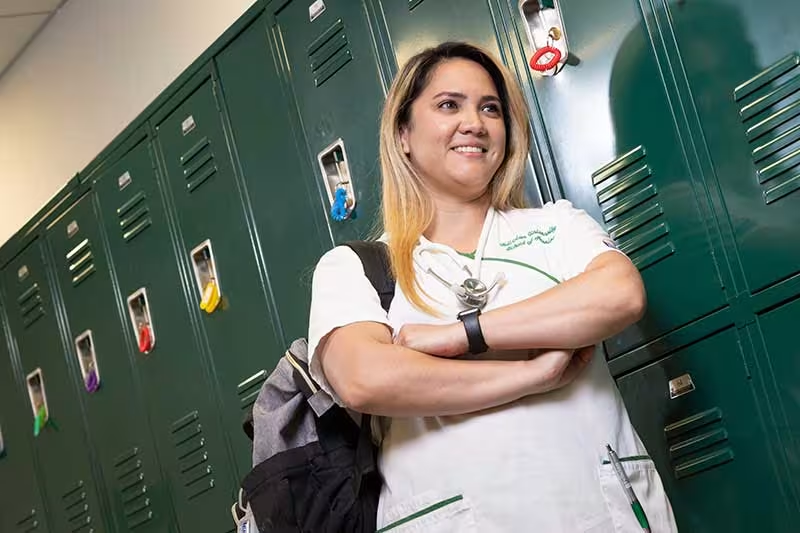Can You Become a Nurse with a Biology Degree?
Each blog post is dated and contains accurate information as of that date. Certain information may have changed since the blog post publication date. If you would like to confirm the current accuracy of blog information, please visit our ABSN overview page or contact admissions at (844) 347-2497.
Can you become a nurse with a biology degree? Yes. By researching and enrolling in the right program, you can make a difference in patients’ lives as a nurse. You will be well-equipped to become a nurse because you have already learned from your previous courses.

If you studied the sciences but have recently felt called to become a nurse, you may be wondering if you can become a nurse with a biology degree. The answer is yes; you absolutely can. A faster pathway into nursing is also available if you pursue a nursing degree through an option like Felician University’s Accelerated Bachelor of Science in Nursing (ABSN) program.
In fact, many ABSN students have previously studied biology and decided it was time to make a career change. See how a biology degree is great preparation for a nursing career and explore how an ABSN program can help you make the most of your time on the path to nursing.
How to Become a Nurse with a Biology Degree
To become a nurse with a biology degree, your previous experience means you will most likely be able to transition into nursing school quickly and jumpstart your career as a nurse.
Nursing is an excellent way to use your biology degree in a meaningful career, with the potential to make a life-changing difference in patients’ lives.
1. Choose a Nursing School
The first step in switching from biology to nursing is to choose a nursing school that’s right for you. Since entering the field with a bachelor’s degree will likely provide you with a higher salary and more career and leadership options, you will want to make sure your nursing school program offers a Bachelor of Science in Nursing (BSN) degree. An ABSN program is a faster way to earn this degree, with our ABSN curriculum offering a path to earn a bachelor’s degree in as few as 16 months.
When choosing a BSN program, here are several key factors to consider when comparing programs.
- Be sure that the program is fully accredited and has approval from all relevant boards. This is important to signify that a program will meet quality standards.
- Find out what prerequisites are needed to enroll in the nursing program because some programs require you to have a prior bachelor’s degree or at least 60 college credits.
- Be aware of GPA or entrance exam requirements.
- Check to see if the program has multiple start dates. If it does, you may be able to start sooner.
- Ensure that the quality of education is strong and that the program will teach you exactly what you need to become a successful and effective nurse.

Are you wondering how to choose a nursing program? Here are eight factors to consider.
2. Learn more with an Admissions Counselor
Once you find the nursing program that is right for you, your first step in the admissions process is to find a time to talk with an admissions counselor. This will be a helpful and informative meeting to ensure you meet all the requirements and to help you plan your schedule as a nursing student.
Meet the Requirements
To be eligible for Felician’s ABSN program, there are a few requirements. Because the ABSN program is accelerated, you will be able to earn your nursing degree in as few as 16 months. You will also spend 40 to 60 hours on coursework, labs, homework, and studying. This means that you must complete all prerequisites with sufficiently high grades to be considered for admission.
At Felician University, you will need to meet admissions requirements including a non-nursing bachelor’s degree OR at least 60 non-nursing college credits with a minimum cumulative GPA of 3.0 in all undergraduate coursework. Lastly, you will need at least a C+ in each of our ABSN prerequisite courses.
Plan Your Schedule
Once you are sure that you meet the requirements, your admissions counselor will guide you through making a timeline for completing prerequisites and applying to school. At Felician University, we offer three start dates each year for the hybrid program — in January, May, and August — and one start date in September for the on-ground program. Knowing your timeline will help you stay on track throughout your journey to become a nurse.
3. Finish Prerequisites
Because you have a biology degree, there’s a good chance you’ve completed most, if not all, of our prerequisite courses. These courses build a strong foundation for academic success throughout our ASBN program. Some of the program materials include subjects in anatomy, chemistry, and statistics.
Learn more about what are the prerequisites for nursing school?

4. Apply to Nursing School
Once you have finished all the prerequisite classes, you can then apply to nursing school. Your admissions counselor will help you work through this process. As part of your application, you’ll need to submit a few things, including official college transcripts, a prerequisite completion form, a professional resume, a personal goal statement or letter of intent, and letters of recommendation.
5. Attend Nursing School and Earn Your BSN
When you receive the exciting news that you have been accepted into the nursing school of your choice, you will need to attend nursing school and do your best in all your coursework to earn your BSN.
As a student at Felician, you’ll have the option between enrolling in the hybrid program based in Parsippany, New Jersey, that combines online courses with in-person labs and clinicals, or the entirely in-person on-ground program at our main campus in Rutherford, New Jersey.
Regardless of your choice, you’ll complete a rigorous blend of nursing coursework, hands-on nursing labs, and clinical rotations in diverse areas of practice. Here’s what you can expect from these three distinct learning components:
Each online or in-person course provides essential nursing knowledge, theories, and materials. The nursing labs provide hands-on skill development with realistic, risk-free scenarios. You will build real-world experience in diverse areas of nursing practices through clinical rotations at top area healthcare facilities.

ABSN Program
Felician University offers both a 16-month hybrid ABSN program and an on-ground ABSN. The hybrid program offers three start dates each year. The on-ground program offers one start date each year.
The ABSN curriculum consists of a combination of nursing coursework, skills, simulation labs, and clinical experiences. During this time, you will apply your biology studies to your education. Your biology studies taught you the foundations of life, which is something registered nurses apply every day on the job.
6. Pass the NCLEX-RN Exam and Become Licensed
The next step to becoming a nurse with a biology degree is to pass the NCLEX-RN, a thorough examination that tests a nurse’s knowledge about numerous subjects. It’s a challenging test, but as a graduate of the ABSN program at Felician, you’ll be prepared to sit for the NCLEX with confidence.
Once you pass the NCLEX and receive your license, you’re a registered nurse — credentials that can take you down an extraordinary career path.
7. Begin Your First Nursing Job
Now that you have your BSN and your RN license, you can choose to work in any number of practice settings, from hospitals and private practices to military bases and cruise ships. You can also pursue certification in a nursing specialty, such as flight nursing, critical care nursing, pediatric nursing, and labor and delivery nursing, to name a few.
As a nurse, you will get to make a positive difference in patients’ lives while applying your learning from nursing school and your background in biology.

Will I Use My Biology Degree in My Nursing Career?
Because you have learned the basics of the foundations of life in your biology degree, you will be able to use this knowledge as a registered nurse daily to make informed decisions about patient care and management. Here are a few of the many ways you might use your biology background as a nurse.
- Provide care based on a patient’s body composition and family medical history
- Ensure a patient gets the right medication for their medical status
- Maintain patient environments free of contamination and infection
Since you have already earned your biology degree, you will have developed effective study habits, including time management, prioritization, and self-discipline.
Take Your First Step to Becoming a Nurse with a Biology Degree
Felician’s hybrid and on-ground ABSN program helps you make the change from a biology degree to a BSN sooner through an innovative mix of online or in-person nursing courses, hands-on labs, and clinical rotations.
Switching from biology to nursing is possible through an accelerated program like our hybrid ABSN program in Parsippany, New Jersey, or on-ground ABSN program in Rutherford, New Jersey.
If you are ready to stop wondering if you can become a nurse with a biology degree and start to act, reach ou today to speak with a Felician University counselor.
